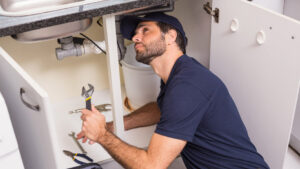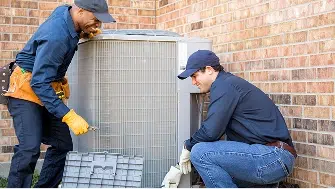Purchasing your first home is thrilling. You’re likely trying to keep track of numerous details about making the right choice. We believe that understanding your potential new HVAC system is crucial. The property’s HVAC system represents a substantial investment and potential source of long-term costs, so being thorough should be a top priority for first-time homebuyers.
In the following guide, we’ll share seven tips for discovering all there is to know about a home’s heating and cooling system. And if you want a more in-depth opinion from the pros, feel free to call Fire & Ice HVAC. Our seasoned technicians can help you compare your options with industry insights that are second to none.
1. Which Kind of HVAC System Does the Home Use?
Start by clarifying what kind of HVAC system the home has. Furnaces generally last longer than air conditioners, and relatively new types of HVAC equipment like heat pumps boast average life spans that are even longer. Getting the details on the make and specific model ensures you have a clear understanding of how much routine maintenance it might need.
2. What Is the Current System’s Age?
Another good idea is to find out how old the HVAC system is when you’re considering a new home. For the most part, HVAC systems last about 10-12 years. Having the knowledge of when it was installed helps you prepare for any needed servicing or considerations if it might eventually stop working. Older systems are more prone to problems, so fiscal planning for a replacement unit could be necessary sooner than you thought.
3. Is the Warranty Active?
Don’t forget to look into whether the HVAC system is still under warranty. If it is, this can assist with maintenance expenses. HVAC warranties typically include parts and labor, but it’s important to note that details will vary. Make sure you go over any terms you don’t recognize to ensure you understand your coverage and potential out-of-pocket costs.
4. Does the System Have a Documented Maintenance History?
Take a close look at the maintenance history of the HVAC system, if this kind of history is available. This kind of information can reveal if the system constantly broke down or how often maintenance is performed. You should at least try to track down a history of key tasks like filter changes, which means it enjoyed more regularly scheduled tune-ups.
5. What Are the Energy Efficiency Ratings?
Selecting a system with high energy efficiency isn’t just smart; it leads to lower utility bills and a smaller environmental impact. Look for the seasonal energy efficiency ratio (SEER) ratings for air conditioning and the annual fuel utilization efficiency (AFUE) for furnaces. Higher SEER ratings mean better cooling across the entire season, while high AFUE ratings illustrate that the fuel is more effectively burned for useable heat.
6. Have You Noticed Signs of Problems During Your Inspection?
Even without the know-how of an HVAC technician, it’s still a good idea to check out the HVAC system yourself. Watch closely for any concerning items that might have been overlooked. This can mean bizarre noises, unequal airflow and attempts at concealing any obvious damage.
7. Have You Asked Your Local HVAC Professional?
If you’re still hesitant to make an offer because of the condition of the HVAC system, it’s never a bad idea to get an assessment and recommendation from experienced HVAC technicians. They are skilled at identifying things you might not, such as leaks in the refrigerant, wiring issues or inefficient ductwork.
A Chat with Fire & Ice HVAC Simplifies Your Home-Buying Journey
Choosing your first home should be thrilling, and Fire & Ice HVAC wants to ensure yours is too. Reach out with us at 703-365-0505. We can talk about how our HVAC services give you peace of mind, giving you what you need to step into your new home with confidence.







